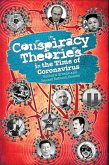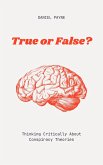Conspiracy theories often arise when people are seeking explanations for events or situations they consider unjust or inexplicable. Frequently, these theories involve the existence of a secret underground group or a conspiracy of those in power behind the events in question. These theories can have their origin in history, in popular culture, or even in the personal experience of the person who develops them. They can also arise as an attempt to give some kind of meaning to situations that may otherwise seem confusing, chaotic, or senseless. However, the vast majority of conspiracy theories lack solid evidence to support them.
Conspiracy theories can be created by a single person or by a group of people who share a common interest in a particular topic. They can also arise as a way to question the veracity of official information or to generate debate and discussion about a particular topic.
In addition, some people may be attracted to conspiracy theories because they provide a sense of control and understanding in a world that may seem chaotic or unknown. They may also feel a certain sense of superiority, believing that they have privileged or unknown information.
But are there people more prone to believe in conspiracy theories than others? Can conspiratorial thinking be combated? What weapons do we have to combat disinformation? What can we do to help someone who has already fallen into the trap of conspiranoia? These and many other questions will be answered in this book.
Conspiracy theories can be created by a single person or by a group of people who share a common interest in a particular topic. They can also arise as a way to question the veracity of official information or to generate debate and discussion about a particular topic.
In addition, some people may be attracted to conspiracy theories because they provide a sense of control and understanding in a world that may seem chaotic or unknown. They may also feel a certain sense of superiority, believing that they have privileged or unknown information.
But are there people more prone to believe in conspiracy theories than others? Can conspiratorial thinking be combated? What weapons do we have to combat disinformation? What can we do to help someone who has already fallen into the trap of conspiranoia? These and many other questions will be answered in this book.
Dieser Download kann aus rechtlichen Gründen nur mit Rechnungsadresse in A, B, CY, CZ, D, DK, EW, E, FIN, F, GR, H, IRL, I, LT, L, LR, M, NL, PL, P, R, S, SLO, SK ausgeliefert werden.









